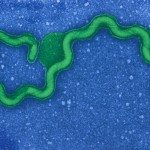Link to Pubmed [PMID] – 29971217
Front Cell Infect Microbiol 2018;8:193
Leptospirosis is a worldwide zoonosis, responsible for more than 1 million cases and 60,000 deaths every year. Among the 13 pathogenic species of the genus , serovars belonging to serogroup Icterohaemorrhagiae are considered to be the most virulent strains, and responsible for majority of the reported severe cases. Serovars Copenhageni and Icterohaemorrhagiae are major representatives of this serogroup and despite their public health relevance, little is known regarding the genetic differences between these two serovars. In this study, we analyzed the genome sequences of 67 isolates belonging to serovars Copenhageni and Icterohaemorrhagiae to investigate the influence of spatial and temporal variations on DNA sequence diversity. Out of the 1072 SNPs identified, 276 were in non-coding regions and 796 in coding regions. Indel analyses identified 258 indels, out of which 191 were found in coding regions and 67 in non-coding regions. Our phylogenetic analyses based on SNP dataset revealed that both serovars are closely related but showed distinct spatial clustering. However, likelihood ratio test of the indel data statistically confirmed the presence of a frameshift mutation within a homopolymeric tract of gene (related to LPS biosynthesis) in all the serovar Icterohaemorrhagiae strains but not in the Copenhageni strains. Therefore, this internal indel identified can genetically distinguish serovar Copenhageni from serovar Icterohaemorrhagiae with high discriminatory power. To our knowledge, this is the first study to identify global sequence variations (SNPs and Indels) in serovars Copenhageni and Icterohaemorrhagiae.

